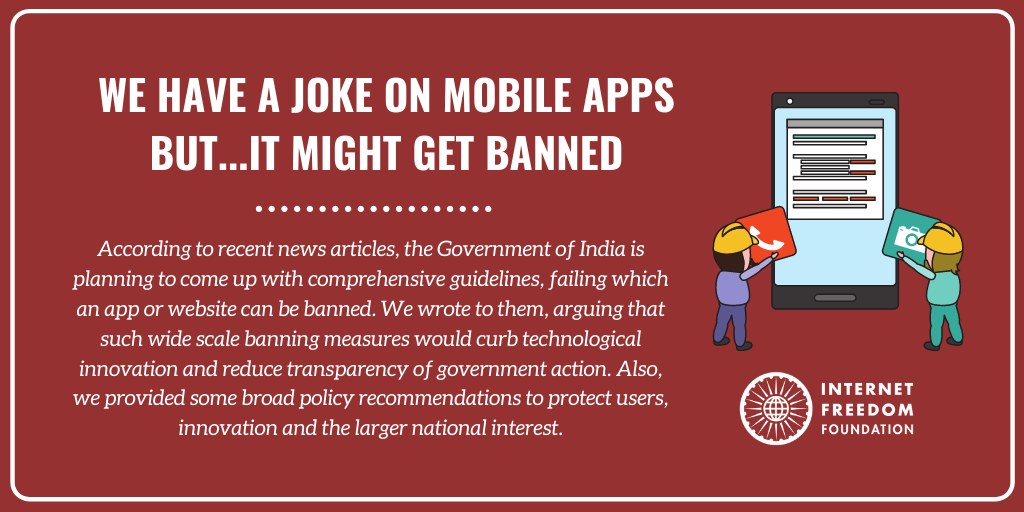
tl;dr
As per news reports a coordinated effort is underway by the Government of India to strengthen its stance on banning mobile apps. According to a senior government official and other sources in the government, the GoI is planning to come out with guidelines, flouting which any app can be banned. Such wide scale banning would undermine nuanced policy approaches for protecting the digital rights of the citizens. We have some alternatives and suggestions to protect users, innovation and the larger national interest. So, we wrote to the Ministry of Electronics and Information Technology (MeitY) urging them to develop a transparent cybersecurity policy, and asking them to expedite the work on the Personal Data Protection Bill.
Proposed guidelines on the banning of mobile applications and websites
In this Economic Times article dated July 27, a senior government official has reportedly stated that the government is currently working on a protocol, which shall define expectations and rules to be fulfilled by all mobile applications. Failure to comply may lead to the application being banned by the government. However, the framework through which these proposed guidelines will be enforced remains unclear. It has been suggested that various ministries including the Ministry of Electronics and Information Technology (MeitY), the Ministry of Information and Broadcasting, the Ministry of Communications, and the Ministry of Home Affairs shall be part of the consultative process, which will form these guidelines or rules.
IFF’s View
In a statement published on July 1, 2020 on the banning of 59 mobile applications we asked for transparency in the process through which these applications had been banned. This is in line with our consistent view regarding the government’s operational practice much more widely when the powers under Section 69A of the Information Technology Act, 2000 are utilised.
We further pointed out that such blanket bans would undermine the digital rights of Indian citizens and set a worrying precedent. These bans are in deviation from the current rule of law framework under the provisions of the Information Technology Act, 2000 and the decisions of the Supreme Court in Shreya Singhal v. Union of India.
We firmly believe that such bans stifle innovation and are harmful to the growing technological ecosystem of the country. While innovators should be assured that the government supports them through a stable and reliable system, strengthening this ‘ban regime’ by legitimising it through official guidelines will hurt the interests of the public at large. Recently, India has seen opaque and arbitrary acts of censorship where websites like DuckDuckGo and WeTransfer and websites dedicated to environmental awareness and activism like FridaysForFuture and LetIndiaBreathe were blocked. A ban regime may further contribute to this ongoing arbitrary practice and thus should not be introduced.
What should be done instead?
In our letter dated 31 July 2020, we wrote to MeitY suggesting that instead of formalising a ban regime, the government should direct its efforts towards both coming up with progressive reforms, and expediting important policy processes for the forumulation of insitutional frameworks of enforcement.
To this effect, we made 4 broad recommendations :
- Advancing the National Cyber Security Policy: We suggested a rights-centred, effective and evidence based approach towards the National Cyber Security Policy that puts India’s interests first. All penalties under it from the life cycle of investments towards operations in emerging and foundational sectors such as technology are the need of the hour. We also suggested that the ongoing process for the formulation of the National Cyber Security Strategy (NCSS) 2020 under which the draft recommendations must be accelerated towards finalisation but first put through another round of expert and public consultation.
- Focus on the Data Protection Bill and the Competition Act: Furthermore, we emphasised the need for a well-drafted Personal Data Protection Bill, which can safeguard the privacy of personal data of citizens through clear standards and evidence. While we understand that the draft bill currently lies with a Joint Parliamentary Committee(JPC) for scrutiny, steps can be taken by MeitY to expedite the process by coordinated effort with the JPC by providing written context and explanations on key legislative choices.
- Considering inter-ministerial inputs on Competition Law: Further there are ongoing processes by the Ministry of Corporate Affairs to examine amendments to the Competition Act in which inputs on data side harms are also being considered. Here, inter-ministerial inputs may be of immense value. This is due to repeated allegations and instances of the abuse of market power and unfair trade practices by technology companies which sometimes if left unaddressed lead to grievances which then lead to demands for ad-hoc actions such as bans.
- Adoption of graded penalties: We also recommended that instead of placing blanket bans on applications which fail to meet the standards set by the NCSS and PDP Bill, the government should adopt a system of graded penalties wherein defaulters can be penalized monetarily and through requisite changes in operational practices in situations of non-compliance. This penalty should be accompanied with a framework which ensures that the defaulter makes an effort to comply with the standards set by the government, failing which further penalties may even be escalated in exceptional circumstances towards complete prohibitions which are term limited, or on repeated violations may even be perpetual.
We intend to follow up and will keep urging all our government institutions to take clear steps to protect your digital rights.
Important Links
- Representation to the MeitY urging them to rethink the move on generalised guidelines for banning apps dated July 31, 2020. [link]
- Our initial statement on the government’s press release on 29 June 2020, which banned 59 mobile apps dated July 1, 2020. [link]
- IFF’s solidarity with LetIndiaBreathe (LIB) and FridaysForFuture and subsequent action on behalf of LIB dated July 13, 2020. [link]
- Blog post on the blocking of DuckDuckGo and our action dated July 2, 2020. [link]
- Blog post on blocking of WeTransfer and our action dated June 9, 2020. [link]
